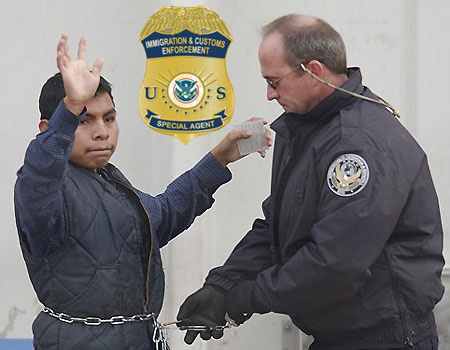New ICE policy may be a harbinger of comprehensive immigration reform

According to new guidelines from Immigration and Customs Enforcement (ICE), director John Morton says his agency will use limited resources from Congress to focus on removing only those illegal aliens threatening U.S. national security and posing a public safety hazard.
The finding comes from a lengthy story by The Washington Times, which reported Morton as saying that ICE only has enough resources to remove 400,000 aliens a year. In all likelihood, this concentrated policy is a harbinger of a bill seeking to establish comprehensive immigration reform.
Certainly, the agency’s modified goals are consistent with what Rep. Luis Gutierrez, a leading proponent of comprehensive immigration reform, wants to see in a prospective bill. "Go after those who are a threat, but leave our families alone until this Congress, and very importantly, this president, fulfills his commitment to comprehensive immigration reform, so that we don't have these problems anymore," Gutierrez said when the comprehensive immigration reform movement first started.
As the Obama administration recently won the first round of nullifying the most controversial provisions of the Arizona law, the executive branch agency’s move is certainly a step in the direction of cracking down on crime that is spilling forth onto U.S. soil. The shifted immigration strategy comes even as detainments of illegal immigrants are up under President Obama, and as Homeland Security Secretary admitted recently that the border can’t totally be sealed.
While ICE is attempting to allocate its resources effectively, there is also a compelling argument from a proponent of implementing Arizona's immigration law. Jan Ting, a Temple University Law professor, makes a thought-provoking case for supporting an Arizona-like immigration policy to counter arguments that a mass deportation isn’t at all reasonable.
Particularly, Ting responds to the crowd that says deporting 12 million illegals is wholly unreasonable.
Ting labels arguments from that crowd as straw man in nature. He seems to make a lot sense that politicians on both the right and left are unwilling to make.
“In Arizona, they understand their policy is attrition,” he said in a televised interview with a Philadelphia Fox television affiliate. “You simply have to get the number of illegals in the United States down every year.”
“People have to see all over the world that America is serious about enforcing its laws to the extent that the number of illegals goes down every year. That’s our goal, not necessarily deporting 12 million people,” he continued.
Ultimately, Ting’s argument boils down to making the level of immigration flow sustainable, so that the United States government knows who is coming into the country. There are other factors to consider as well besides educating and providing healthcare for illegal aliens.
“We have a lot of costs, not just education and emergency healthcare, but crime and environmental costs. How many more billion barrels of oil do we need to import? How many more million tons of coal are we going to have to burn to provide electricity? So there are an enormous number of costs involved here. It’s not just education, but education and healthcare are part of it,” he said.
Out of many arguments heard over the immigration policy debate, I believe Ting’s is probably one of the more plausible ones, for it seeks to look at the broadest possible implications of having a loose immigration policy.




